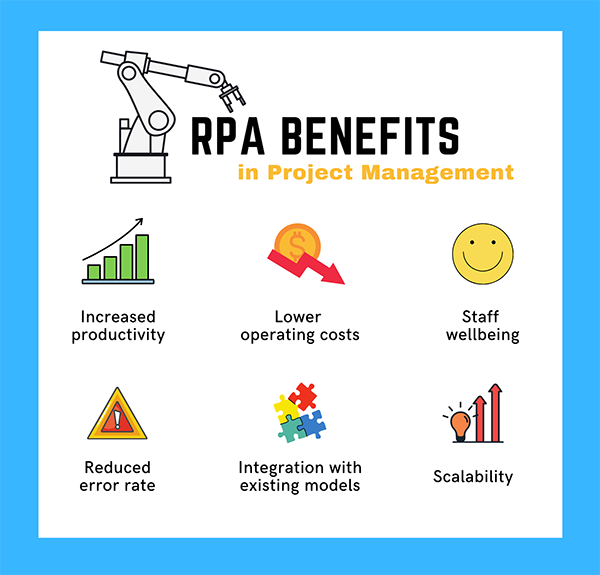Robotic Process Automation (RPA) is becoming more intensively present in our daily life from online shopping and data transfer to customer registration. RPA in project management is taking on greater importance, with software bots standing out as essential assistants. Robotic process automation is a fundamental technology that automates structured and repeatable processes to enable projects and processes to run with greater efficiency and productivity. However, unlike traditional software tools that manage simplified, basic processes, RPA software solutions automate increasingly complex tasks and projects.
RPA bots are capable of performing multiple functions at once and interacting with the software themselves. For example, a bot could receive a request by email and extract the appropriate data from an Excel spreadsheet. Then, it can tailor its response to the request. This way, organisations can automate tasks such as invoicing from beginning to end. In addition, they can use RPA software bots without any prior knowledge of programming language. Drag-and-drop interfaces and intuitive rules mean that business users can implement RPA bots in almost any process.
RPA is widely adopted because of its significant impact on productivity, compliance and quality with some predicting that more than 72% of businesses will be investing in RPA over the next years. Let’s take a closer look at how RPA is influencing the project management sector.
The Benefits of RPA in Project Management
 Increased Productivity
Increased Productivity
To begin with, the predominant way that RPA is impacting project management is by creating efficient processes that increase productivity. According to McKinsey, fewer than one in three projects are completed on time, so any process that can bring you closer to completion will impress your clients. RPA can produce anything from client accounts to invoices in a second, often at the click of a button.
Lower Operating Costs
By automating tasks that you would normally have employees undertake, the operating costs of projects making use of RPA are inevitably lower. RPA doesn’t do away with employees altogether. Human intervention is necessary for maintenance and to step in when there are exceptions to given processes. But RPA bots enable companies to reduce staff costs significantly.
Staff Wellbeing
By introducing RPA to perform the rule-based tasks on your project you will minimise the amount of time staff need to perform mundane data-entry and administrative tasks. When employees focus on the tasks that challenge them, the risk of burnout is reduced and staff wellbeing is improved.
Reduced Error Rate
The rate of human error when performing mundane tasks is high. This can be costly in time and revenue for project managers. RPA bots interact on an elemental level with applications. As a result, errors are almost entirely minimal.
Integration With Existing Models
Project managers are often hindered from optimising their processes because of complex interlinks between steps. For instance, to refigure one element of your project would require an entire restructuring of other elements of your work. RPA neatly bypass this issue by optimising processes without requiring any rethink of the structures around them.
Scalability
RPA bots are eminently scalable. By simply adding more instances of an RPA’s function you can quickly increase your business operations. This enables businesses to be sharply responsive to fluctuations in demand and changing markets.
The Risks Associated With RPA
On the other hand, there are some costs when relying on RPA in project management. Although the benefits of implementing this technology far outweigh the costs, Project Managers need to be acutely aware of these risks. RPA functioning on top of traditional software depends on the smooth function of source applications. Human intervention is still required in RPA-enabled processes and the cost of implementing new technology may be high, especially at the cutting edge.
The Future Is Here
So long as project managers calculate the risks of layering up a software tool powered by RPA, and are familiar with the reduction in operating costs they can expect, RPA has enormous scope to transform project management. Reduction in errors plus an increase in staff wellbeing, allow employees to focus on creative tasks, and offer a great customer experience. By introducing data-driven decision making, project resource management can be optimised. To sum up, we can expect the role of RPA in project management to keep on growing.
Author Bio
Ashley Halsey is a writer at London Writing Service and freelance tech journalist. She studied English and Computer Science at the University of San Diego and teaches high school English in Fresno.
RPA in action with real business application cases





